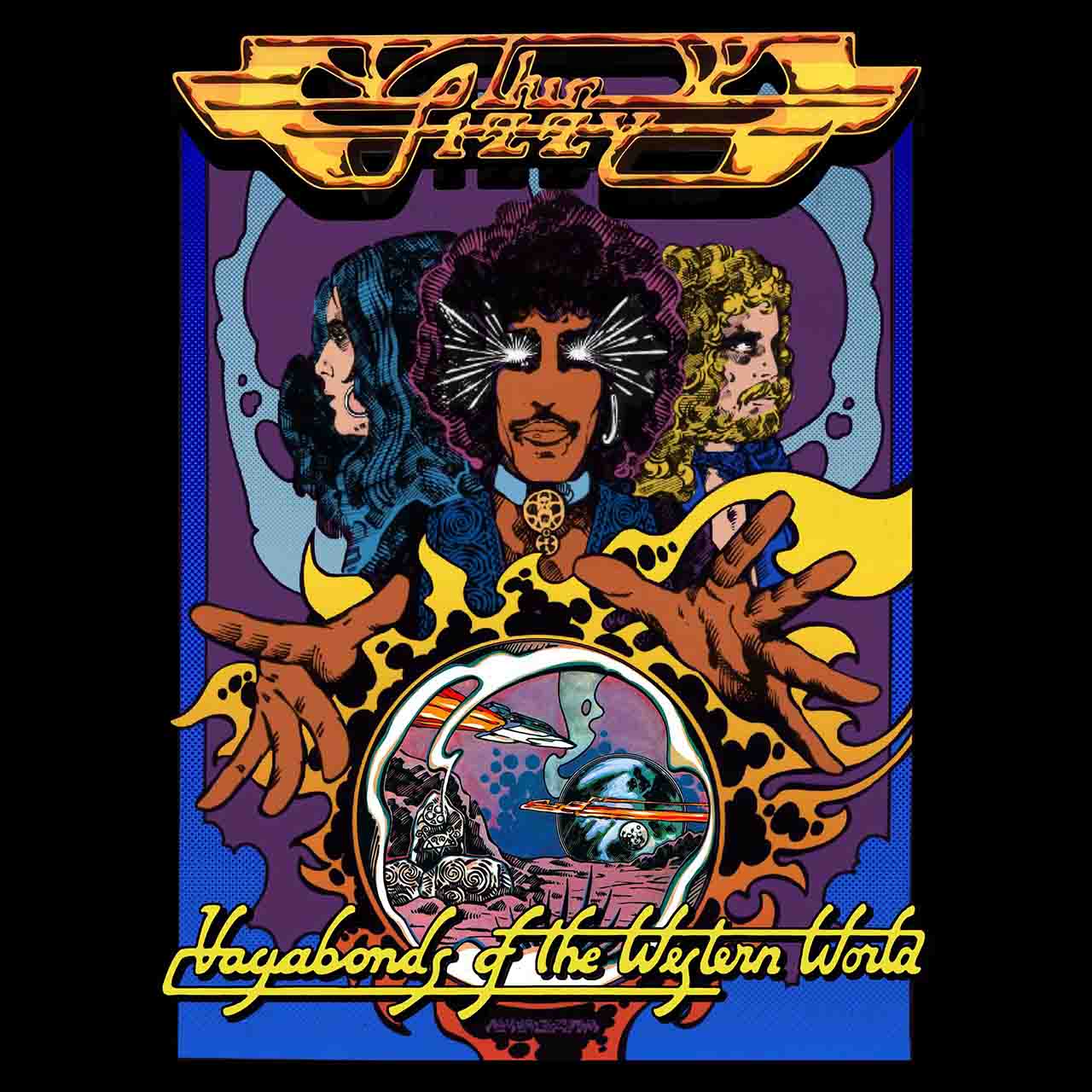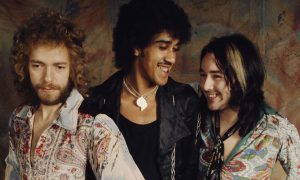Thin Lizzy frontman Phil Lynott stepped into Decca Studio 4, London, in July 1973 as a man with something to prove. He was there to record Lizzy’s third album, Vagabonds Of The Western World, their first full-length since their take on the Irish traditional “Whiskey In The Jar” had been a surprise hit earlier that year.
Though they were initially reluctant to release it, that breakthrough single had given the band a new sense of confidence, bolstered by a triumphant homecoming tour of Ireland in Spring 1973. A UK tour supporting Slade in late 1972 – and a wake-up call from the headline act’s manager Chas Chandler, who’d also represented Lynott’s hero, Jimi Hendrix – had inspired the previously introverted frontman to work at his stagecraft, adding raunchy new moves to his onstage repertoire and dazzling audiences. Things were seemingly on the up.
Watch the official video for Thin Lizzy’s “Whiskey in the Jar.”
But as happened so often with Thin Lizzy, with success came setbacks. The success of “Whiskey In The Jar” led to record label pressure to follow it up with another rocked-up take on an Irish traditional – “Danny Boy” and “It’s A Long Way To Tipperary” were apparently mooted. Lynott was not only acutely aware of the potential negative reaction of some elements of the Irish rock community to such a move, but he was keen to show off his own songwriting and fought to release an original as the next single. He got his way, but the romantic bossa-nova of “Randolph’s Tango” was a flop. Lynott was devastated, as guitarist Eric Bell told Classic Rock in 2024, “He eventually realised that we’d blown it, and that affected him pretty deeply.”
After licking his wounds, Lynott kicked back writing his strongest material to date for Vagabonds. The album’s first single, “The Rocker,” was a swaggering declaration of intent that denoted a new sense of purpose and urgency. It’s the sound of a preening and strutting, leather-clad butterfly emerging from its studded chrysalis. Over brash guitar riffs and careening drums, Lynott boasts of his street smarts and sex appeal with snarling and believable insouciance. His lyrics always teemed with heroic outlaws; here he was casting himself in the role. With a fatherless, itinerant childhood and a fascination for Irish mythology, westerns, and Marvel comics, it’s not hard to see where this preoccupation came from. One of the few things Lynott knew about his father growing up was that his nickname was “The Duke.” It’s a short jump to “The Rocker.” This was songwriting as a form of self-actualisation; a means of creating a persona that Lynott, by all accounts a sensitive soul, would adopt wholly in his public life. And it’s topped off by a fireworks display of a guitar solo from Bell that suggests that whatever scrape this rocker gets into, his gang has got his back.
Elsewhere, the heads-down boogie of eco-conscious opener “Mama Nature Said” and the hard funk of “Gonna Creep Up On You” are further pointers towards heavier things to come for Lizzy. The same goes for the near-title track, “Vagabond Of The Western World,” a blistering psych-rock workout which tells the story of a rootless philanderer, another thinly-veiled example of Lynott taking inspiration from his absent father. “Slow Blues,” meanwhile, lives up to its name, a wronged and woeful Lynott pouring his heart out over a smouldering, late-night blues.
Not everything on Vagabonds spoke of Lynott’s transformation into a swashbuckling, streetfighting rock god. The slow-burning “Little Girl In Bloom” sounds like nothing else here, or indeed elsewhere in rock music. Lynott’s austere bass improbably foreshadows Joy Division while never quite gelling with Brian Downey’s swinging drums and the off-kilter melody, creating a melancholic tug intensified by a tender vocal. Meanwhile, Eric Bell’s guitar is an exercise in cool restraint, all spare, heavily treated single notes, till the midpoint of the song where, as if echoing a sense of liberation, he embarks upon a joyfully untethered solo.
Once again, Lynott’s lyrics draw upon his past, this time alluding to his former girlfriend, Carole Stephens, and his estranged child. Stephens became pregnant in December 1967, and Lynott suggested the pair run away to join his mother in England. Instead, Stephens told her family and she was whisked away to a convent 60 miles from Dublin, unbeknown to Lynott. Five days after giving birth, Stephen was forced to hand her son over to the Catholic Protection and Rescue Society of Ireland and didn’t see him until 2000. It was only months after, when Lynott bumped into Stephens in Dublin that she was able to tell him. “The two of us went to the cartoon cinema, and I told him everything,” Stephens told Graeme Thomson in his definitive 2016 Lynott biography Cowboy Song. “We sat at the back and we sobbed… We had to wait until it was dark until we came out. In terms of our relationship there was no going back.” Lynott didn’t tell a soul about his child until the mid-70s, when he explained the lyric to artist Jim Fitzpatrick, who was illustrating a book of his poetry.
Lynott’s poetic side also surfaced on the tender “A Song While I’m Away,” on the surface the kind of burnt-out, on-the-road dispatch that rock stars tend to write around their third album. In Lynott’s hands though, it became something genuinely moving, as convincing a love letter to his cherished Ireland (“And far away hills look greener still, but soon they’ll all slip away”) as to anything else.
Vagabonds didn’t make Thin Lizzy stars, but it laid the foundations for the band’s future success and Lynott’s development as a songwriter and frontman. It also brought about the end of the first era of the band. Lizzy toured relentlessly to support the album and while life on the road and its accompanying decadence suited Lynott’s cast iron constitution, Eric Bell suffered. The tour took its toll on the guitarist and months of hard living came to a head at a Belfast gig in which he had an onstage breakdown, leaving Lynott and Downey to play the majority of the show as a two-piece. Bell wouldn’t play with Lizzy again, he’d be replaced by the twin guitar attack of Scott Gorham and Brian Robertson. A new era of the band was about to begin, with the rock’n’roll glory that Lynott dreamt of drawing ever closer on the horizon.




